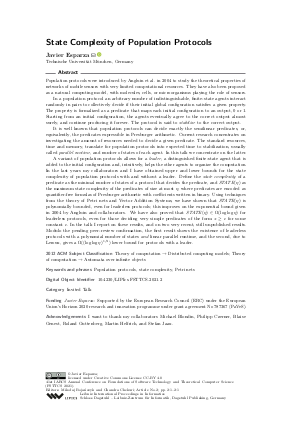State Complexity of Population Protocols (Invited Talk)
Author
Javier Esparza 
-
Part of:
Volume:
41st IARCS Annual Conference on Foundations of Software Technology and Theoretical Computer Science (FSTTCS 2021)
Part of: Series: Leibniz International Proceedings in Informatics (LIPIcs)
Part of: Conference: IARCS Annual Conference on Foundations of Software Technology and Theoretical Computer Science (FSTTCS) - License:
 Creative Commons Attribution 4.0 International license
Creative Commons Attribution 4.0 International license
- Publication Date: 2021-11-29
File

PDF
LIPIcs.FSTTCS.2021.2.pdf
- Filesize: 371 kB
- 1 pages
Document Identifiers
Subject Classification
ACM Subject Classification
- Theory of computation → Distributed computing models
- Theory of computation → Automata over infinite objects
Keywords
- Population protocols
- state complexity
- Petri nets
Metrics
- Access Statistics
-
Total Accesses (updated on a weekly basis)
0Document
0Metadata
Abstract
Population protocols were introduced by Angluin et al. in 2004 to study the theoretical properties of networks of mobile sensors with very limited computational resources. They have also been proposed as a natural computing model, with molecules, cells, or microorganisms playing the role of sensors.
In a population protocol an arbitrary number of indistinguishable, finite-state agents interact randomly in pairs to collectively decide if their initial global configuration satisfies a given property. The property is formalized as a predicate that maps each initial configuration to an output, 0 or 1. Starting from an initial configuration, the agents eventually agree to the correct output almost surely, and continue producing it forever. The protocol is said to stabilize to the correct output.
It is well known that population protocols can decide exactly the semilinear predicates, or, equivalently, the predicates expressible in Presburger arithmetic. Current research concentrates on investigating the amount of resources needed to decide a given predicate. The standard resources, time and memory, translate for population protocols into expected time to stabilization, usually called parallel runtime, and number of states of each agent. In this talk we concentrate on the latter.
A variant of population protocols allows for a leader, a distinguished finite-state agent that is added to the initial configuration and, intuitively, helps the other agents to organize the computation. In the last years my collaborators and I have obtained upper and lower bounds for the state complexity of population protocols with and without a leader. Define the state complexity of a predicate as the minimal number of states of a protocol that decides the predicate, and STATE(η) as the maximum state complexity of the predicates of size at most η, where predicates are encoded as quantifier-free formulas of Presburger arithmetic with coefficients written in binary. Using techniques from the theory of Petri nets and Vector Addition Systems, we have shown that STATE(η) is polynomially bounded, even for leaderless protocols; this improves on the exponential bound given in 2004 by Angluin and collaborators. We have also proved that STATE(η) ∈ Ω(log log η) for leaderless protocols, even for those deciding very simple predicates of the form x ≥ c for some constant c. In the talk I report on these results, and on two very recent, still unpublished results. Modulo the pending peer-review confirmation, the first result shows the existence of leaderless protocols with a polynomial number of states and linear parallel runtime, and the second, due to Leroux, gives a Ω((log log η)^{1/3}) lower bound for protocols with a leader.
Cite As Get BibTex
Javier Esparza. State Complexity of Population Protocols (Invited Talk). In 41st IARCS Annual Conference on Foundations of Software Technology and Theoretical Computer Science (FSTTCS 2021). Leibniz International Proceedings in Informatics (LIPIcs), Volume 213, p. 2:1, Schloss Dagstuhl – Leibniz-Zentrum für Informatik (2021)
https://doi.org/10.4230/LIPIcs.FSTTCS.2021.2
BibTex
@InProceedings{esparza:LIPIcs.FSTTCS.2021.2,
author = {Esparza, Javier},
title = {{State Complexity of Population Protocols}},
booktitle = {41st IARCS Annual Conference on Foundations of Software Technology and Theoretical Computer Science (FSTTCS 2021)},
pages = {2:1--2:1},
series = {Leibniz International Proceedings in Informatics (LIPIcs)},
ISBN = {978-3-95977-215-0},
ISSN = {1868-8969},
year = {2021},
volume = {213},
editor = {Boja\'{n}czyk, Miko{\l}aj and Chekuri, Chandra},
publisher = {Schloss Dagstuhl -- Leibniz-Zentrum f{\"u}r Informatik},
address = {Dagstuhl, Germany},
URL = {https://drops.dagstuhl.de/entities/document/10.4230/LIPIcs.FSTTCS.2021.2},
URN = {urn:nbn:de:0030-drops-155139},
doi = {10.4230/LIPIcs.FSTTCS.2021.2},
annote = {Keywords: Population protocols, state complexity, Petri nets}
}
Author Details
Funding
- Esparza, Javier: Supported by the European Research Council (ERC) under the European Union’s Horizon 2020 research and innovation programme under grant agreement No 787367 (PaVeS).
Acknowledgements
I want to thank my collaborators Michael Blondin, Philipp Czerner, Blaise Genest, Roland Guttenberg, Martin Helfrich, and Stefan Jaax.
